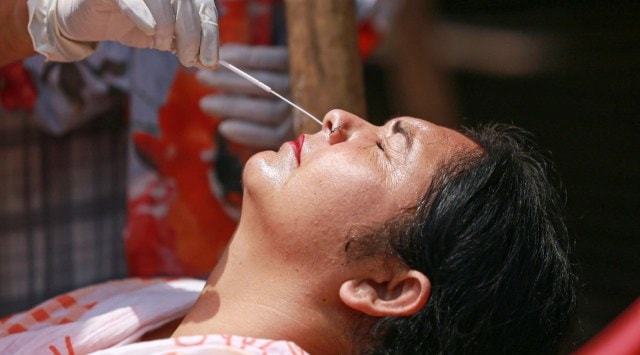- India
- International
COVID-19 Breakthrough Infections: Why we should not bother
Immunity and protection against diseases are dependent upon many factors and complex interactions. Therefore, any simplistic approach is not helpful. Once mucosal vaccines are available, we can expect a little better protection from infection but still our risk would continue, says Dr Chandrakant Lahariya.
 A healthcare worker conducts Covid-19 testing of a woman as coronavirus case surge countrywide, in Jammu. (PTI, file)
A healthcare worker conducts Covid-19 testing of a woman as coronavirus case surge countrywide, in Jammu. (PTI, file)There is a renewed discussion on COVID-19 breakthrough infections (people who are fully vaccinated, yet testing SARs CoV2-positive). This is understandable as with a fresh spike in COVID-19 cases in Indian states, a majority of patients are those who have received the mandatory two shots. Is this a reason for worry? The short answer is no.
Let’s start with a few key points. First, with COVID-19, neither a past infection or full vaccination prevents a subsequent infection. There are two different terms used to describe the situation. A second infection in a person with confirmed past infection is termed “reinfection.” However, an infection in an individual, who has been vaccinated, is termed “breakthrough” infection. It has got this interesting name as it arguably is a “breakthrough” for pathogens which could jump the immunity barrier.
Second, is it possible to stop any future infection? The answer is only in a scenario of “sterilising immunity.” This is a kind of immunity, which, once developed, is ready to clean up the pathogen once it comes in contact with the immune host. However, developing that kind of immunity is dependent upon multiple factors: host immune system, time since last exposure and/or vaccination, route of infection, pathogen’s incubation period and amount of viral exposure, among many others. There is no sterilising immunity in true sense. Some diseases such as smallpox (which was eradicated in 1980) and measles come close to developing such immunity. However, even in those diseases some re-infections have been reported.
Third, natural infections, and as a rule for most pathogens, are more likely to provide stronger and long-lasting immunity than vaccines. We know one infection with measles provides nearly life-long immunity and protection. However, if a measles vaccine shot is administered, the protective effectiveness is around 85 per cent. That’s why a second dose of measles vaccines is recommended which brings effectiveness to around 95 to 98 per cent, still short of 100 per cent protection.
Fourth, the level of immunity is also influenced by the route of infection. SARS CoV2 is mainly a mucosal infection and immunity and protection against this type of infection is always weak and lower. Respiratory viruses, which infect through mucous membranes of the nose and throat such as SARS-COv2 and have a high propensity for mutation, are unlikely to provide sterilising immunity.

Fifth and most important, the use of the term “breakthrough infection” is misleading and not fully appropriate. It is now widely known that most SARS CoV2 vaccines, including those being used in India, have no evidence in reducing transmission. There is a consensus that vaccines prevent moderate to severe disease and hospitalisation. Till now, only mRNA-based vaccines (Moderna and Pfizer-BioNTech) are known to have some temporary protection from infection and transmission as well. And even that protection from infection and reducing transmission declines rapidly after three months. The role of non-mRNA COVID-19 vaccines in preventive transmission is unproven and unknown. Therefore, terming SARS CoV2 infection in a fully-vaccinated person as “breakthrough infection” is akin to testing a very well-performing student of class V for the syllabus of class VIII (in which he or she fails to perform well) and then arguing that she/he is not a good student. Clearly, it is a wrong measurement tool. We should not use the word “breakthrough infection” in the context of COVID-19 vaccines, at least for the two predominant COVID-19 vaccines being used in India.
The performance of vaccines should be measured against what they intend to protect. Most of the vaccines, be it COVID-19 or other vaccines in the childhood vaccination programme, can be classified into the group of vaccines which provides “functional immunity or protection.” This essentially means as much protection as possible and well above an agreed cut-off (It was agreed at 50 per cent efficacy for COVID-19, well before the first vaccine for COVID-19 was given emergency use authorization), against the adverse outcome such as moderate to severe disease.
The durability of immunity is variable for different diseases. What we know is that antibody levels decline over a period of time; however, a specific type of cellular immunity continues. Irrespective of all of this, no matter what, against subsequent infection, a person is better off than the time he or she was unvaccinated. That is the case with SARS CoV2 as well.
SARS CoV2 is the seventh coronavirus detected to have infected human beings. The first four coronaviruses – OC43, 229E, NL63, and HKU1 – caused mild illnesses only. Studies on those coronaviruses have shown that immunity against them declined over a period of time and re-infections were common.
Immunity and protection against diseases are dependent upon many factors and complex interactions. Therefore, any simplistic approach is not helpful. There is no doubt scientists and vaccine researchers would continue to work and do everything needed to ensure that we are better protected. Once mucosal vaccines are available, we can expect a little better protection from infection but still our risk of infection would continue.
At an individual level, the key is to get vaccinated with an age-appropriate country-recommended vaccination schedule. Thereafter, follow a basic preventive approach as recommended. High risk individuals need to be more careful. Do not bother to get antibodies tested.
However, from the perspective of health policy makers and epidemiologists, there is some utility in studying and understanding infections and re-infections in vaccinated individuals as well as those with past infections. Such data would provide us useful insight to prepare for the future, design vaccination schedules and other preventive strategies.
Next time when someone mentions “re-infection” or “breakthrough infection” in the context of COVID-19, tell them, “At an individual level, it doesn’t matter.”
(Dr Lahariya is a primary care physician who specialises in infectious diseases and vaccines. He is Founding-Director of ‘Foundation for People-centric Health Systems’, New Delhi. He tweets at @DrLahariya)
Buzzing Now
Apr 20: Latest News
- 01
- 02
- 03
- 04
- 05



































